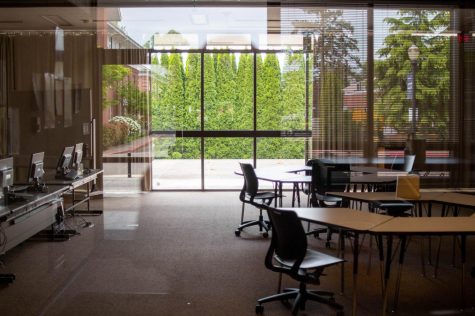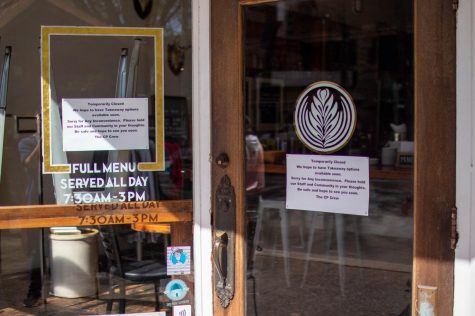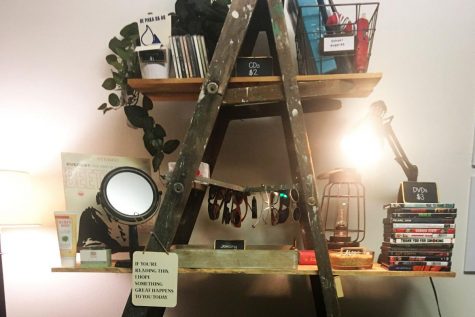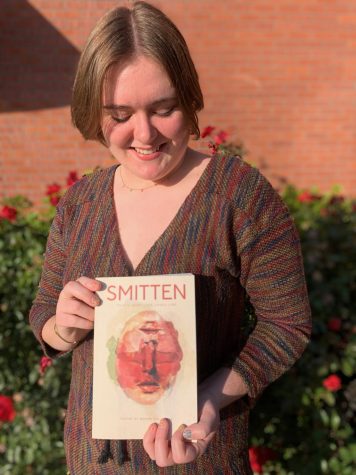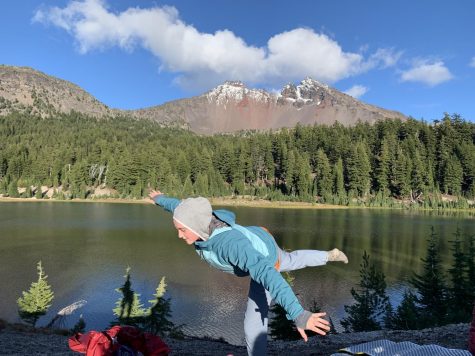Professors write petition aimed at protecting student rights, academic freedom in wake of election
December 6, 2016
In the wake of the presidential election, many students and faculty, especially those belonging to minority groups, expressed not only shock and astonishment at the result but genuine fear.
Fear that their safety, both physical and intellectual, might be violated.
English professor Reshmi Dutt-Ballerstadt and political science professor Nick Buccola acutely sensed the pain and anxiety that the election had created in their students.
Many had horrifyingly real fears of deportation, or discrimination not seen since the 1950s and the days of racial segregation. “I believe [we] have a moral and ethical obligation to protect these students that we have admitted, since they are members of our community,” said Dutt-Ballerstadt.
Dutt-Ballerstadt said Trump’s campaign rhetoric made many “fear about the future . . . The anxiety is even more pronounced for citizens and others belonging to various minority groups – namely the Muslims, the undocumented, [LGBTQI] community and their rights.”
Similarly, Buccola said, “I felt duty-bound to do something to move these conversations forward so that we do all that we can as an institution to protect the rights of our students, faculty, and staff in our current political environment.
Dutt-Ballerstadt and Buccola took action by writing a petition asking Linfield President Thomas Hellie to adopt or at least discuss adopting certain additions to the college’s harassment policy.
The petition grew out of “a place of urgency to protect our most vulnerable students on our campus,” Dutt-Ballerstadt said.
The goal of this petition was not to create policy but to “put some ideas on the table and to provide members of a community with the opportunity to express support for those ideas (if they deem them worthy of support),” said Buccola.
Dutt-Ballerstadt said, “We have an ethical and moral obligation to provide all our students, faculty and staff with a sense of safety, and when this sense of safety is violated we are also obligated to also have a mechanism of justice in place.”
This petition is an attempt to open conversation about policies in place and policies that need to be created to protect student, faculty, and staff at Linfield.
It states, “In the face of rhetoric and policy proposals deeply at odds with this commitment, we recommend a strong institutional reaffirmation of our commitment to open inquiry and free expression . . . Mutual respect is only possible when the stated policies are fully observed, implemented, and each member of our community stands up for the equal rights of others.”
It lays out five recommendations for the administration to help reduce harassment and facilitate a discussion about how to create a community that deals with these issues and does not shy away from protecting students and faculty.
The five recommendations are: to extend Linfield’s harassment policy to include undocumented, DACAmented (Deferred Action for Childhood Arrival) students, faculty, and staff; to adopt this amendment to Linfield’s harassment policy as the campus anti-discrimination policy; establish a harassment response team; work towards declaring Linfield a “sanctuary campus”; and reaffirm Linfield’s commitment to academic freedom.
In keeping with other colleges and universities, the suggestion to make Linfield a sanctuary campus would mean “Inform[ing] students, faculty, and staff as soon as possible what Linfield College can and will do to provide their privacy and provide sanctuary from unfair deportation, investigation, or other discriminatory intimidation,” according to the petition.
The petition also states that the Linfield community has “ an urgent responsibility to take concrete steps to protect members of our community by reminding our students of their existing rights to privacy (which will keep their immigration status confidential, just as it does their grades, records, and medical information).”
“My primary hope is that this petition will advance the cause of protecting the rights and dignity of our students, faculty, and staff . . . The petition is meant to start a conversation, not to end one,” stressed Buccola.
The petition has been signed by about 405 members of the Linfield community.
Kate Henley, ‘19, said, “Everyone, regardless of who they are or where they come from, deserves to feel accepted. I think this petition is a very important step towards helping people feel welcome and safe on campus.”
Like Henley, many heard about the petition through social media sites or departmental emails because the Dean of Students Office and ASLC declined to forward the petition to students.
Susan Hopp, Vice President of Student Affairs and Athletics, declined to forward the petition and said ASLC and social media might be better avenues for the petition to reach the student body.
Dutt-Ballerstadt and Buccola wanted the petition to go out to all students, not just those with social media accounts.
ASLC President Nathan Pellatz said in an e-mail to Dutt-Ballerstadt that after much discussion and a vote, ASLC decided not to forward the petition to the student body because it was “inherently political” and ASLC tries to be neutral.
Pellatz said “it would cause too much of a controversy for our students” and suggested that another avenue might be better for circulating the petition.
Several departments, including the English and Sociology and Anthropology departments, have forwarded the petition and it continues to circulate on social media, though it did end this weekend.
President Hellie seemed open to discussing the recommendations in the petition with students, faculty, and staff, according to Dutt-Ballerstadt.
Buccola said, “I have been very encouraged by President Hellie’s statements to the community since the election and I am glad he has taken several steps already in order to be sure the rights and dignity of our students is protected.”
He suggested that many people are still trying to wrap their minds around President-Elect Trump and what his administration might look like but it is important not to let uncertainty dictate actions in the coming days.
“Going forward, all of us must use our imaginations so that we can be vigilant in our defense of the rights and dignity of all members of our community,” said Buccola.



